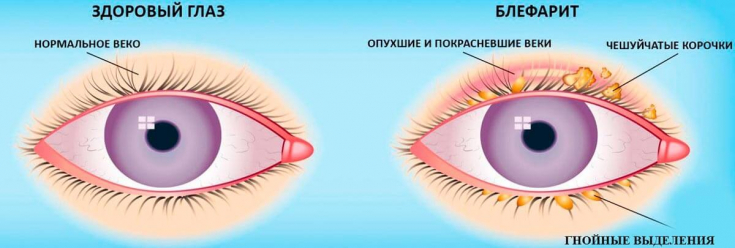Rosacea is a common chronic inflammatory skin disease .
Many aesthetic treatments, including skin care, chemical peels, and laser treatments, can reduce skin redness and visible blood vessels.
In this regard, patients with rosacea are often encountered in aesthetic practice.
Eye involvement may occur in 58-72% of patients with rosacea.
On estet-portal.com read about the types of eye damage in rosacea, the main symptoms and effective methods for treatment of ophthalmic rosacea.
What is ophthalmic rosacea
There are 4 subtypes of rosacea:
- erythematous telangiectatic;
- papulo-pustular;
- phymatous;
- ophthalmic rosacea.
Ophthalmic rosacea affects the skin of the periorbital region, which can lead to vision-threatening complications.
Aesthetic medicine specialists may be the first to encounter such patients, so it is very important to know the symptoms of eye damage in ophthalmic rosacea in order to refer the client to an ophthalmologist in a timely manner.
The exact pathological mechanisms of rosacea remain poorly understood, although some studies indicate elevated levels of pro-inflammatory cytokines such as interleukin-1? & .beta. and metalloproteinzy-8 and 9.
Complex treatment of rosacea: when the skin asks for help
The main manifestations of ophthalmic rosacea
Patients with ophthalmic rosacea may complain of symptoms such as:
- eye irritation;
- feeling of a foreign body in the eye;
- burning sensation;
- sensitivity to light;
- lacrimation.
Ophthalmic rosacea can affect the lids and surface of the eye, leading to blepharitis, conjunctivitis, or even corneal involvement in more severe cases.
- Blepharitis
In ophthalmic rosacea, blepharitis or inflammation of the margin of the eyelids may occur.
You may notice that the edge of the eyelids along the lash line looks red.
The skin may thicken and telangiectatic blood vessels become visible. Meibomitis is a type of blepharitis that usually accompanies rosacea and occurs when the inflammation is localized specifically in the meibomian glands.

The meibomian glands secrete the oily part of the tear film when they become inflamed or blocked, which can lead to dry eyes. As a result, patients experience eye irritation, which can lead to inflammation or damage to the surface of the eye.
Treatment of meibomitis is different from anterior blepharitis, including conservative therapies such as eyelid hygiene, application of hot compresses to the eyelids followed by eyelid massage.
The purpose of this treatment is to use heat to liquefy the congestion in the glands.
Read the latest articles on Facebook!
- Conjunctivitis
Inflammation of the eyelids and poor quality of the tear film can lead to inflammation of the conjunctiva.
The first thing the doctor sees in this case — this is redness of the whites of the eyes.
are often the first step in treating ophthalmic rosacea. For flare-ups of conjunctivitis associated with rosacea,
hormonal eye dropsmay be used temporarily to help control the inflammation.
- Keratitis
- In more severe cases, ophthalmic rosacea can affect the
. In these cases, oral medications may be recommended.
Oral tetracyclines such as
doxycycline,not only have antibacterial properties, but also immunomodulatory effect.
A typical regimenthat can be used is 100 mg doxycycline once a day by mouth for a three-month period. Early detection of ophthalmic rosacea and timely treatment of the disease can prevent serious complications, including blindness, in the future.
Goutta rose: the main approaches to the treatment of rosacea







Add a comment